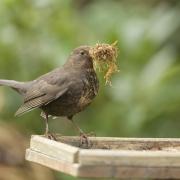Scrivener’s Books and Bookbinding is something of a mecca for literary types

Scriveners Books and Bookbinding is something of a mecca for literary types. It is not just famed locally for its 40,000 plus collection housed over five teetering floors of the Victorian corner shop in Higher Buxton, but its inclusion in The Guardian’s top ten list of second-hand bookshops has ensured it has its place on the national stage, too.
My first thought as I began to explore and climb the narrow, rickety staircases, was that a person could easily lose himself in here. Given that many people whose passion is second-hand books tend to be, shall we say, a little eccentric and maybe even a touch absent-minded, I suspected that such a person might find it extremely easy to become so engrossed that they might manage to get themselves shut in the shop overnight, or something like that.
Apparently they have. Frequently.
‘It happened four times in the first few years,’ says Alastair Scrivener, who founded the business one winter’s afternoon 18 years ago. ‘What usually happened is that we left a phone number in a prominent position so people could ring us, but eventually we just used to hang a key there, so they could let themselves out.’
Embarrassing.

Entering Scrivener’s is like opening the covers of a book and walking into the story – it seems somehow so much bigger than the physical space which confines it. The cellar (fishing, natural history and archaeology) also serves as a museum, and has the building’s original kitchen range as the focal point of a mock-up parlour.
The first floor (children’s books and comics) has a serve yourself café area, and continue climbing skywards towards the very top of this fairytale castle and you will find, tucked behind a pile of books (where else?), a working harmonium, where a sign invites ‘competent players’ to have a go.
The whole shop has an air of relaxed surrealism about it. It is as comforting as the memories of your favourite childhood stories. Indeed, as you negotiate your way through the maze, you may even fancy that you can sense the presence of familiar characters. Was that Richmal Crompton’s William and his band of outlaws I just heard, off on another adventure? But they are always just that one step ahead, elusive as a dream, always just around the next corner.
I mention this feeling of escapism to Alastair as we sit on the sofa in the café area, surrounded by cartoon cushions and a huge, stuffed tiger which is keeping a careful eye on me. Escapism. Alastair smiles. He has a feeling for words and he likes that one. Alastair has recently retired and one time employee Miranda Midlane has now taken on the shop, but Alastair is such a part of the Scrivener’s story I wanted to talk to him too.
Alastair grew up in Leamington Spa and these formative years have, in some ways, defined his life. ‘I used to sneak out of school at lunchtimes,’ he tells me. ‘There was a bookshop there which this was modelled on. It was a big, tall building against the side of the railway line. It had a few electric lights and floors and floors of books, and when trains went past it shook. That’s where my interest in books began. We didn’t have any books at home.’

As an art teacher Alastair had already begun bookbinding as a hobby, but when he retired early from his teaching job he decided to make a go of bookbinding and selling second-hand books full time. The move from the craft centre in Over Haddon to the current shop in Higher Buxton had inauspicious beginnings.
‘We moved in one afternoon when it was snowing,’ Alastair recalls, ‘With several hundred second-hand books. It was like the biggest mistake you could make – the weather was against us, everything seemed to be against us, and we’d only been selling second-hand books for 12 months.’
But the gamble paid off and three years later Alastair was joined by bookbinders Holly Serjeant, who had just completed a degree in Calligraphy and Bookbinding, and then by Janet Hopley, an old school friend of Holly’s, who trained on the job.
Miranda Midlane first tried to buy the business over ten years ago. She’d heard Alastair was thinking of selling so she came to Buxton for a look around, but it seemed she had been misinformed. ‘So I left a note saying I wanted to buy the bookshop if he was selling it any time, with my phone number on it,’ says Miranda. ‘About three months later he phoned me up and said he was looking for an extra person, would I like a job? So I thought well, yes, I would!’
Miranda finally took over the reins from Alastair last June. She has a long association with second-hand bookshops and has worked in the British Library, but is quick to tell me that she doesn’t have any formal library qualifications. ‘I think any librarian who comes in here has a nervous breakdown!’ she says. ‘There is something about second-hand books that doesn’t equate with tidiness and order, and everything having to be just right.’

Much of the thrill of working with second-hand books is the sheer serendipity of it. Unlike a bookshop selling new stock, there is no warehouse to phone and put in an order – you are totally dependent on what people bring in. This can lead to ‘wonderful surprises’, as Miranda puts it. The reward is rarely financial, but occasionally there can be big money involved. Miranda tells a story about a scruffy old book they found without covers, which the owner was about to throw away. Further investigation revealed it to be a herbal book by German botanist Leonhard Fuchs, who later gave his name to the Fuchsia. ‘It was from about 1540, something like that. Alastair restored it and rebound it and it went to auction and fetched an awful lot of money. Something like £17,000,’ says Miranda.
There are twelve staff on the payroll at Scrivener’s Books and Bookbinding, and many people would assume that they are fighting a rearguard battle to survive in this digital age. That is the received wisdom, but the story doesn’t seem to be unfolding quite like that. ‘Books are now challenged due to the electronic industry and it fills me with apprehension,’ says Alastair. ‘But it doesn’t seem to affect us. Because people like books, they like to handle books.’
Internet or no internet, Scrivener’s tries to root itself firmly in the real world. It is a hub for local arts and writers’ groups, and they are involved with Buxton’s burgeoning Fringe Festival. One event they are staging is ‘The Ghosthunter’s Club’, where, to quote from the publicity: ‘Professor Tony Stoney-Middleton and Miss Pringle invite you to investigate the ghostly goings-on over the five creaky floors of Scrivever’s Bookshop.’ Spooky.
It isn’t that Scrivener’s has completely ignored the online world – they sell through the online booksellers AbeBooks – it is just not where they do the majority of their business. ‘We have probably got 500-600 books online at any one time,’ says Miranda. ‘It does help to keep us going through the winter – January and February can be a bit desert-like in here. But it is very boring selling books online compared to dealing with human beings.’
Holly Serjeant tells me that there is a ten week waiting list for the bookbinding service. Their work comes in from all over the UK and some from overseas too. Rebinding these old books can be like unpicking the threads of history itself. The original binders, who may have bound the book in the 1700s or earlier, will often have left their mark, hidden away in their workings. ‘There are little bookplates from the original binder, and we always take them out and put them back in when we rebind them,’ says Holly.

I ask if Scrivener’s has its own mark, when they have worked on a book. Apparently they don’t, though Janet tells me they have thought about having some stickers produced. ‘We should,’ says Holly. ‘Because it is a part of the history of the book, isn’t it? If it lives for another 300 years, it would be nice for another bookbinder to come across it one day.’
Now that Alastair has stepped down, it is Miranda’s job to take the shop forwards. ‘I think everybody puts their own personality into a bookshop,’ says Miranda. ‘This is a very theatrical shop, and that is partly because of what Alastair has been like, and because Alastair is an artist. But it will go on doing that because my partner, Terry, is also an artist and involved in theatre.’
Miranda, with her bright red hair, takes a sip of tea and casts a glance towards the tiger, which is casually draped over the back of the sofa, content and purring in a patch of sunlight. ‘I like the fact it surprises people all the time,’ she continues, looking back to me. ‘Children come up here and find the tiger hidden behind the sofa, or occasionally people play the harmonium and things like that. And a lot of people feel relaxed here, which is nice.’
‘Oh yes,’ I agree. ‘It is a very relaxing atmosphere.’ I take a sip of tea, too.
And then the tiger gives a yawn, stretches, and says: ‘Are you finished with all your questions yet?’ which might have been rather rude, had I been paying proper attention. But I wasn’t. I had been distracted by the fleeting shadows of William and his gang of outlaws, rushing past the open doorway and breathlessly making their way up the next flight of stairs en route to explore another floor – in search of another perfect summer adventure.




























